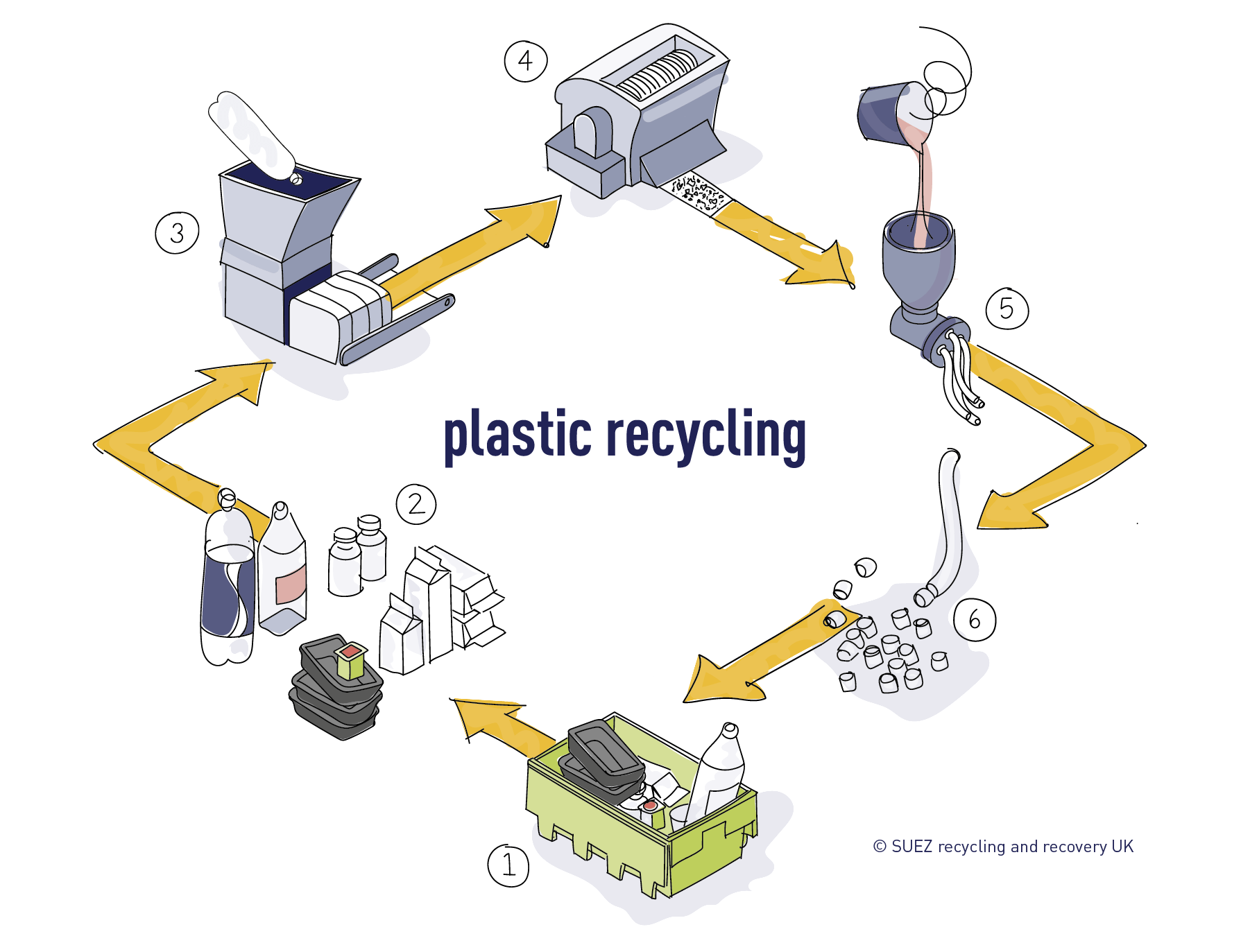Recycled Plastics
Recycled plastics play a crucial role in reducing greenhouse gas emissions, conserving natural resources, and minimizing environmental impacts. This process involves collecting, sorting, and reprocessing plastic waste into new products, creating a circular economy.

Plastic Recycling Process (Suez)
View open jobs in this Solution
Example Companies
- Resynergi - Resynergi focuses on the global problem of waste plastics.
- Pyrowave - Pyrowave closes the loop of polymer lifecycle by bringing plastic waste back to life.
- Infinited Fiber Company - Infinited Fiber Company is on a mission to make circular fashion and textiles an everyday reality
- Gen Phoenix - Gen Phoenix recycles materials to produce advanced upholstery and cladding materials.
- Blocktexx - BlockTexx is a clean technology company that recovers polyester and cellulose from textiles and clothing.
- Banyan Nation - Unlocking the circular economy and the market for premium recycled plastics in India.
- Loop Industries - Pioneering plastics recycling into virgin-quality materials.
- Green Dot Bioplastics - Develops biodegradable and compostable plastics.
- TerraCycle - Specializes in recycling hard-to-recycle materials.
- Suez - Provides comprehensive waste management and recycling services.
Overview
Recycled plastics combat climate change by reducing greenhouse gas emissions from plastic production. Recycled plastic pellets, plant-based, and biodegradable plastics contribute to emission reduction and waste elimination. Major corporations like Coca-Cola and Nestlé, along with startups, are leading in recycled plastic development.
- A Look at the Circular Economy - Climate Drift
- Boox Delivers Sustainable E-commerce for the Next Generation - Warming Up to Climate Tech
- Shloop is The Sustainable Footwear Manufacturer of The Future - Warming Up to Climate Tech
- Beni Makes Secondhand Shopping Seamless - Warming Up to Climate Tech
Progress Made
Significant advancements have been made in plastic recycling technologies:
- Recycled Plastic Pellets: Made from post-consumer, industrial, and agricultural waste, these pellets replace virgin plastic in various applications.
- Plant-Based Plastics: Biodegradable plastics made from renewable resources reduce reliance on fossil fuels.
- Advanced Recycling Processes: Innovations in sorting, cleaning, and processing plastics improve efficiency and reduce emissions.
Solutions by Sector
Packaging
- Recycled Content Packaging: Using recycled plastics in packaging materials.
- Biodegradable Packaging: Developing packaging that breaks down naturally.
- Reusable Packaging: Designing packaging that can be reused multiple times.
Case Studies:
- Loop Industries, USA: Pioneers in recycling plastics into virgin-quality materials (Loop Industries). While innovative, the scalability and economic viability of their processes remain challenges.
- Banyan Nation, India: Unlocks the circular economy and the market for premium recycled plastics (Banyan Nation). The company has been praised for its innovative approaches but needs to address the environmental impact of its supply chain.
- Green Dot Bioplastics, USA: Develops biodegradable and compostable plastics (Green Dot Bioplastics). The company faces challenges related to the economic feasibility and scalability of its products.
Construction and Automotive
- Recycled Plastic Lumber: Using recycled plastics to produce durable building materials.
- Automotive Parts: Incorporating recycled plastics into vehicle components.
- Insulation Materials: Developing insulation products from recycled plastics.
Case Studies:
- Axion Structural Innovations, USA: Produces recycled plastic lumber for construction (Axion). The company has faced scrutiny over the durability and environmental impact of its products.
- Ford Motor Company, USA: Uses recycled plastics in vehicle components (Ford). While commendable, the overall environmental impact of the automotive industry remains a concern.
- PlasticsEurope, Europe: Promotes the use of recycled plastics in construction and automotive industries (PlasticsEurope). The organization emphasizes the need for stronger regulations and incentives.
Consumer Products
- Recycled Plastic Textiles: Producing clothing and accessories from recycled plastics.
- Household Products: Developing everyday items from recycled materials.
- Electronics: Using recycled plastics in electronic devices.
Case Studies:
- Adidas, Global: Produces shoes and apparel from recycled ocean plastics (Adidas). While innovative, the company's overall environmental impact and supply chain practices require scrutiny.
- Patagonia, USA: Uses recycled plastics in outdoor clothing and gear (Patagonia). The company is praised for its sustainability efforts but faces challenges related to the scalability of its practices.
- Dell, USA: Incorporates recycled plastics in electronic devices (Dell). The company has made significant strides in sustainability but needs to address the overall environmental impact of electronic waste.
Lessons Learned
-
Successes:
- Recycled plastics significantly reduce greenhouse gas emissions and conserve natural resources.
- Efficient recycling processes and new technologies have made plastic recycling more sustainable.
-
Failures:
- Poor recycling practices can lead to pollution and waste issues.
- Manufacturing recycled plastics can release toxins into the environment.
-
Lessons Learned:
- Investing in recycling infrastructure and technology is crucial for reducing emissions and conserving resources.
- Addressing environmental and social impacts is essential for sustainable plastic recycling.
Challenges Ahead
- Quality Issues: Recycled plastics often have lower quality than virgin plastics, limiting their applications.
- Energy-Intensive Processes: Recycling plastics can be energy-intensive, increasing costs.
- Infrastructure Needs: Insufficient recycling infrastructure hinders scalability.
- Public Awareness: Increasing awareness about the benefits of plastic recycling is essential.
- Corporate Accountability: Ensuring companies are held accountable for their environmental practices and potential greenwashing.
Best Path Forward
- Public Awareness: Increase public awareness about the benefits of plastic recycling.
- Corporate Responsibility: Encourage businesses to adopt sustainable plastic recycling practices.
- Infrastructure Development: Improve recycling infrastructure to support large-scale operations.
- Research and Development: Invest in R&D to develop more efficient recycling methods.
- Policy Support: Implement policies and regulations that incentivize plastic recycling.
Prominent supporters include The Recycling Partnership, TerraCycle, and Loop Industries.
Image credit: Suez